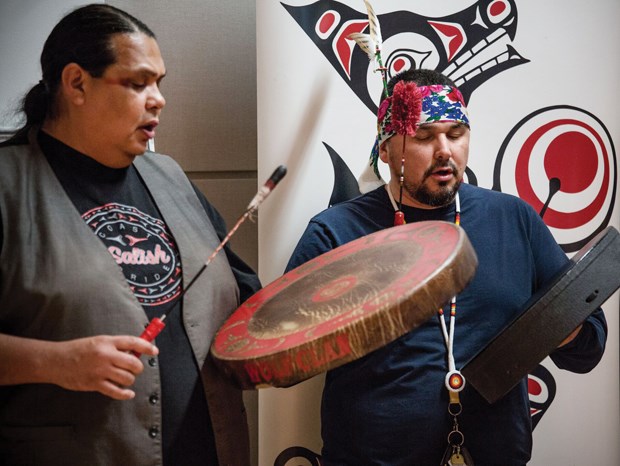All eyes are on the National Energy Board as its decision on Kinder Morgan’s application for a new pipeline to Burrard Inlet is due by Friday.
The energy company’s leadership are “optimistic and hopeful” the NEB will recommend the project be built but local First Nations remained doggedly opposed.
Tsleil-Waututh Sacred Trust Initiative manager Rueben George recently returned from Kinder Morgan’s annual shareholders’ meeting in Houston, Texas where he took the opportunity to dampen any hopes of Kinder Morgan’s investors.
“We told them the Canadian constitution protects our indigenous rights. We told them our First Nations have won 170 legal cases in the last few years. That’s 97 per cent victories by First Nations on resource extraction,” he said. “I said ‘You guys are business people. Why would you invest in something that isn’t a sound business?’…It’s pretty obvious we’re going to stop it.’”
In 2014, the Tsleil-Waututh filed a lawsuit against the National Energy Board, the federal government and Trans Mountain that argued they had not been properly consulted.
The newly elected federal government asked for a stay in that case in January in order to meet with the Tsleil-Waututh and re-evaluate whether it would continue the court battle. Since then, there were only cursory meetings and the federal government opted to maintain its position in the case.
“I wouldn’t call them meetings because our chief wasn’t there. It wasn’t the proper consultation,” George said, noting the band did not get the opportunity to present its own assessment of the project and its risks.
That ruling from the federal court is due “soon,” George said, and it is not clear what that might mean for the NEB process.
On Tuesday, the Trudeau government named its ministerial panel that will further review feedback and engage with communities and Indigenous groups as well as consider upstream greenhouse gas emissions from the project from June until November. That inspired little faith in George.
“It’s flawed from the start. Mr. Trudeau knows the public doesn’t trust the NEB decision,” he said. “We know it’s bad but it’s hard to unscramble a scrambled egg.”
Kinder Morgan spokeswoman Ali Hounsell said the company has tried many times to meet with Tsleil-Waututh Nation leadership only to be rebuffed.
“We have been working hard with many other First Nations and we are working towards reaching mutual benefit agreements with them. To date, the majority of those groups located along the pipeline corridor in Alberta and British Columbia have provided written letters of support for the project to the National Energy Board,” she said. “It’s the kind of relationship that we have with many of those First Nations we also hope to form with Tsleil-Waututh,” she said.
Should the NEB recommend the project, it will likely come with more conditions, over and above the 150 already announced by the NEB, Hounsell said.
“For us, the NEB process has been thorough and rigorous and an important step but it doesn’t mean our engagement and our relationships are over. We want to continue to reach out to people and work with communities,” she said.
Terry Beech, Liberal MP for Burnaby North-Seymour, was in question period and unavailable to comment Tuesday afternoon, but he told the Burnaby Now he wouldn’t speculate in advance of the decision.
“I think they have a track record, and you can speculate based on that,” he said. “I’m going to wait until (the decision).”
Beech said his focus is on the ministerial representatives and ensuring his constituents have their voices heard. He also said there will be a local meeting on Kinder Morgan and climate change on July 16.
“We’re working on opportunities for (Natural Resources Minister James) Carr and (Environment Minister Catherine) McKenna to visit the riding,” he added.
If approved, the Trans Mountain pipeline expansion would triple diluted bitumen exports from 300,000 to 890,000 barrels a day. Traffic in the harbour would increase from five to 34 oil tankers each month.
– with files from Jennifer Moreau/Burnaby Now



